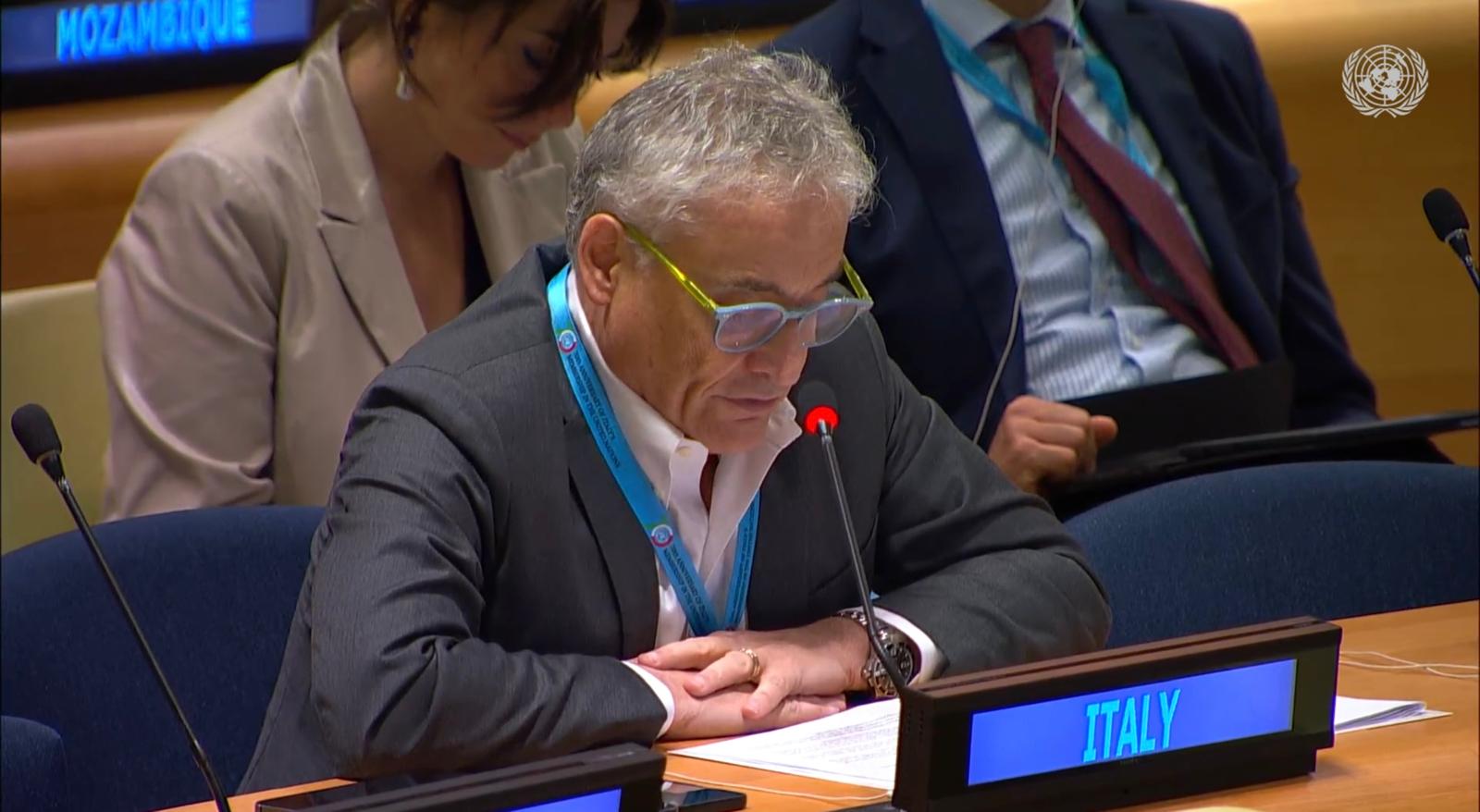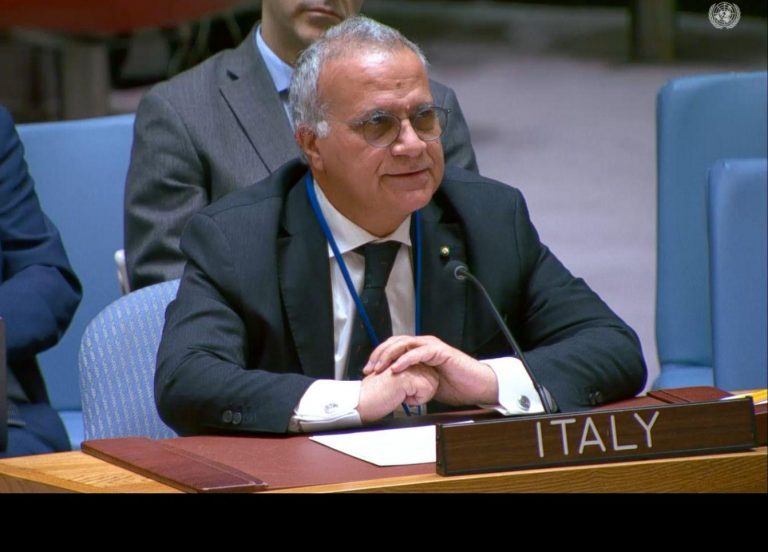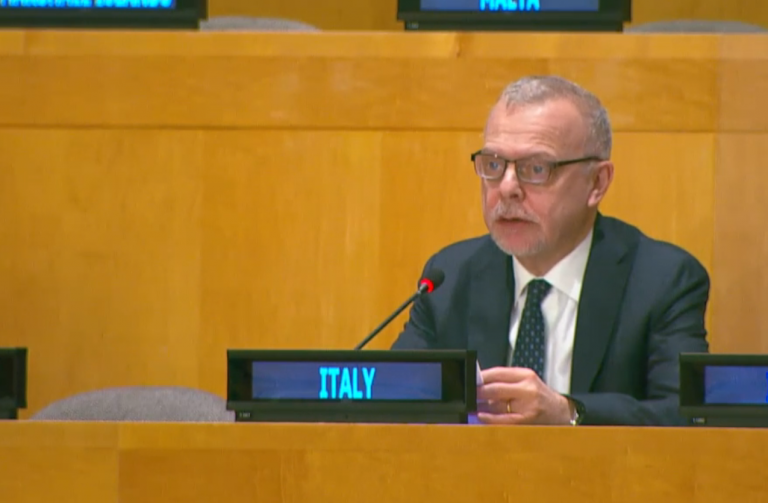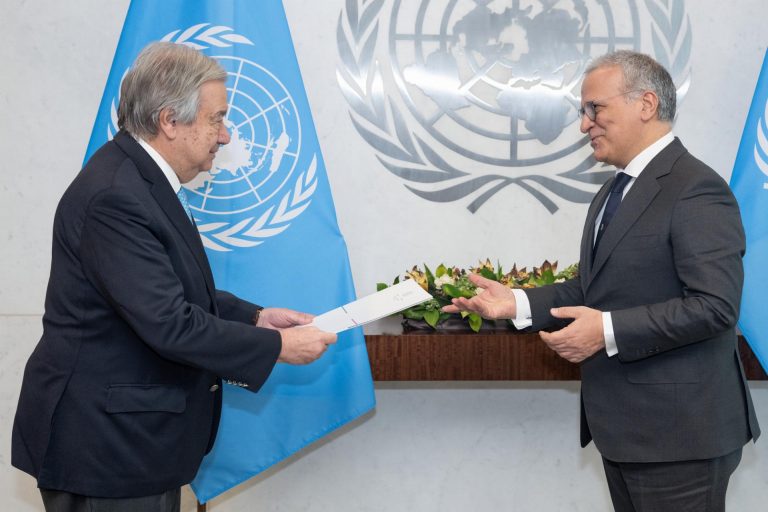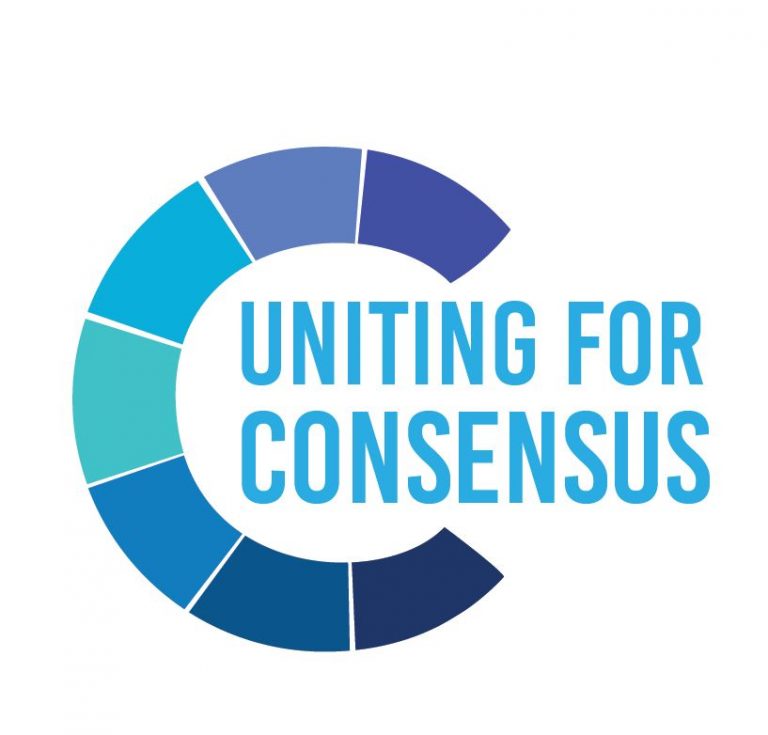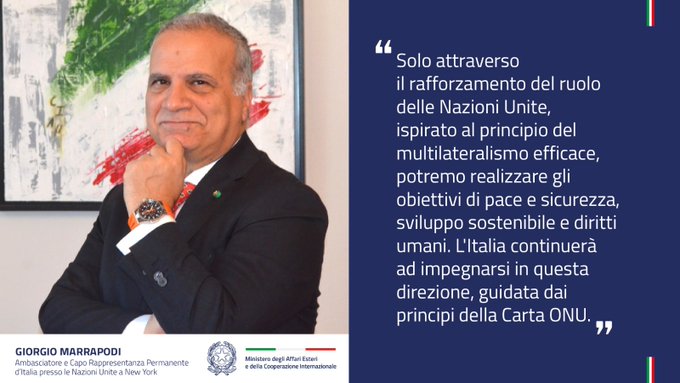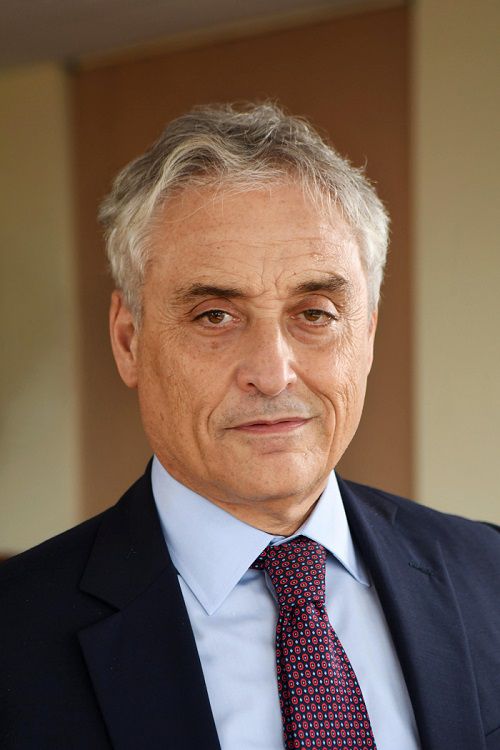Distinguished Chair,
I have the honour to speak on behalf of the Uniting for Consensus (UfC) Group, a cross-regional, pro-reform group comprising Argentina, Canada, Colombia, Costa Rica, Malta, Mexico, Pakistan, the Republic of Korea, San Marino, Spain, Türkiye, and my own country, Italy.
Let me begin by thanking you for convening this session of the Intergovernmental Negotiations on Security Council reform and for circulating the Revised Chairs’ Elements Paper, which we have taken note of.
Despite the global challenges, in the current session the broad and growing support for a comprehensive reform of the Security Council was reaffirmed and the continued legitimacy and relevance of the IGN as the sole platform for advancing this important process was confirmed.
The UfC Group remains firmly committed to a reform that makes the Security Council more representative, democratic, accountable, transparent, effective, and responsive to today’s global challenges.
We wish to begin by noting that the time available to thoroughly review the Revised Chairs’ Elements Paper was limited. Adequate time for reflection and consultation is needed to have enriched discussions.
Nonetheless, we appreciate your clarification that the document reflects the Chairs’ understanding of the current state of the IGN discussions and is under your authority, including on procedural aspects. On that basis, we welcome your invitation to provide comments aimed at ensuring the document faithfully captures both areas of convergence and divergence that emerged during this session of negotiations.
Allow me to offer a few general observations, reflecting the UfC’s understanding of the discussions and of the positions expressed.
Following the Summit of the Future in September 2024, we welcome the renewed momentum that has reinvigorated the reform process. In this regard, we are in favor of reaffirming the guidance provided by the Pact in the Elements Paper. However, we recall that the Intergovernmental Negotiations (IGN) process emanated from Decision 62/557 and continues to be conducted in accordance with its key provisions, including the five interlinked clusters. In this regard, we caution against any formulation suggesting that the Pact for the Future or any of its actions constitutes a formal mandate for the IGN. Action 39 sets out clear parameters to guide the work of the IGN, but working within the mandate already provided by the General Assembly.
While we acknowledge the encouragement to submit further reform models and the revision of already presented models for the structured dialogues, we underscore that the actual objective remains to progressively build such a model over time – through the reaching of convergence across the five clusters and continued dialogue among delegations.
Additionally, we would like to recall that certain delegations, including the UfC, have indicated in IGN sessions that there are yet steps to be taken and other potential models need to be presented and discussed, before considering a consolidated model as the next phase forward.
Given the nature of the Pact, we therefore recommend avoiding the use of terms such as “mandate” or that “the consolidated model is a clear objective” and rather use alternative language in the introduction section – such as “welcoming the Pact” or referring to its “galvanizing effect” on the reform process.
To this point, in order to provide an accurate framework, we suggest, in line with paragraph 68 of the Pact for the Future, the inclusion in the section “Work of the IGN during UNGA79” of the following language:
“We support the Member States-driven nature of the reform of the Security Council, and will intensify efforts for the reform through the IGN in accordance with General Assembly Decision 62/557 and other relevant resolutions and decisions of the General Assembly, such as resolution 53/30.”
Mr. Chair,
Regarding the Elements of General Convergence, the UfC continues to attach great importance to the following principles:
- The reform process must remain Member State-driven;
- The IGN is the only legitimate, inclusive, and appropriate platform to pursue reform;
- Outcomes must command the widest possible political acceptance, in line with General Assembly Decision 62/557, and the clear threshold established by resolution 53/30;
- Given the interlinkages between the five clusters, the process must uphold the principle that “nothing is agreed until everything is agreed.”
Turning to the core principles underpinning Security Council reform we wish to reiterate that for UfC the principles of democracy and accountability are paramount. Other negotiating groups and individual Member States also have underscored these principles, which, in our view, can only be meaningfully upheld through periodic elections that provide all Member States with the opportunity to participate in the Council’s composition.
After the presentations of various reform models and the insightful debates that followed, we remain firmly convinced that the introduction of new permanent seats – as proposed by some – runs counter to the democratic values the Council should embody.
On paragraph 6, we welcome the acknowledgment that reform should prioritize enhancing the representation of underrepresented and unrepresented regions and groups. This includes the Asia-Pacific, Latin America and the Caribbean, in addition to the broadly recognized imperative of improving African representation.
Under paragraph 7, concerning the inclusion of a review clause in a comprehensive reform of the Security Council, we suggest a more balanced reflection of the discussions. Many delegations support a review mechanism to assess whether a reformed Council is functioning more effectively and transparently in the years following reform. However, it must also be noted that several Member States oppose any approach that could serve as a vehicle for incremental or selective gains, or that could lead to piecemeal reform. This, by the way, also reflects the original rationale of Article 109 of the Charter, which was to allow for periodic assessment of the overall functioning of the Organization.
On paragraph 12, related to Working Methods, we agree that improvements to the Council’s functioning can and should be pursued even without Charter amendments. That said, it is essential to distinguish between working methods of the current Council and those of a reformed Council. The ongoing efforts – such as those under the Informal Working Group on Documentation and Other Procedural Questions (IWG) – should be clearly acknowledged as pertaining to the current situation and not conflated with the broader discussions of comprehensive reform of a future Council. This distinction ensures a targeted approach to incremental improvements while maintaining the integrity of the wider reform of the Security Council agenda.
On paragraph 16, we note that structured dialogues on models of reform have indeed proven useful. However, to reflect the full scope of activity, this section should reference not only the dialogues held during the 78th session but also the discussions that took place during the 79th session – most notably on the Liechtenstein revisited model and the CARICOM proposal.
On paragraph 18, we suggest adding after “new” the qualifier “elected” to avoid misunderstandings, as criteria provided for in Article 23.1 of the United Nations Charter refer only to non-permanent members.
Finally, we believe that this process would be significantly strengthened by broader participation. Many Member States and negotiating groups have yet to voice their views in the IGN. Given the importance and sensitivity of the reform agenda, and the need to ensure that any outcome enjoys the widest possible political acceptance, we encourage all Member States and negotiating groups – particularly those who have not yet done so – to actively engage and, where possible, present their own proposals or models for reform.
To this end, we would welcome the inclusion in the document of a clear call for enhanced participation ahead of the next session of the IGN. In this context, we would also propose adjusting the language in paragraph 19, replacing “continue to agree to the submission of further models” with “continue to encourage the submission of further models.”
Under the divergences of the Elements of General Convergence and Divergence, we align with the recognition that further steps are required before moving to text-based negotiations. It is important that a transition to this phase is done once genuine convergence on all clusters of reform and broad political will is reached.
Concerning the clusters, while we appreciate the document’s focus on areas of convergence, we urge caution in overstating the degree of alignment. Some points currently presented as convergences are in fact divergences.
For example, on categories of membership, the formulation: “While there are different views on the categories of membership in a reformed Council, a significant number of delegations argue that the enlargement should include expansion in both the permanent and non-permanent categories,” does not accurately reflect the reality.
First, as we have said before, because a significant number of Member States have not stated their views yet in the IGN, it is important to avoid overgeneralizations about the state of convergence. In this regard, a distinction must be made between the views expressed by negotiating groups and those of the wider UN membership, especially considering that some groups have overlapping compositions.
Second, it is important to clearly distinguish between the nature of the permanent seats advocated by some Member States and negotiating groups. In particular, some proposals envision permanent seats of a regional nature – such as those requested under the Common African Position. In contrast, other proposals, such as those put forward by the Group of Four (G4), seek individual permanent seats that would represent only the respective Member States themselves.
Third, others support the creation of new permanent seats but without veto.
As you can see, divergences could not be broader. To put all these seats into the same nature and claim, as the Elements Paper states, that “a significant number of delegations argue that the enlargement should include expansion in both the permanent and non-permanent categories” is misleading in our view and the paper would more accurately reflect the positions of delegations if it made this distinction clear.
Mr. Chair,
We trust that these comments will be taken into serious consideration. The Revised Elements Paper demonstrates that tangible progress is possible, and it confirms that the IGN remains the only valid and legitimate platform for achieving Security Council reform.
We thank you once again for your dedication to this process and reiterate UfC’s full commitment to constructive engagement in the pursuit of a Security Council that is more representative, democratic, accountable, transparent, and effective.
I thank you.







